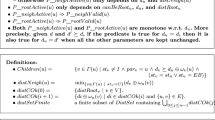Abstract. We present a deterministic distributed depth-first token passing protocol on a rooted network. This protocol uses neither the processor identifiers nor the size of the network, but assumes the existence of a distinguished processor, called the root of the network. The protocol is self-stabilizing, meaning that starting from an arbitrary state (in response to an arbitrary perturbation modifying the memory state), it is guaranteed to reach a state with no more than one token in the network. Our protocol implements a strictly fair token circulation scheme. The proposed protocol has extremely small state requirement – only \(3(\Delta +1)\) states per processor, i.e., \( O(log\;\Delta )\) bits per processor, where \(\Delta\) is the degree of the network. The protocol can be used to implement a strictly fair distributed mutual exclusion in any rooted network. This protocol can also be used to construct a DFS spanning tree.
Similar content being viewed by others
Author information
Authors and Affiliations
Additional information
Received: July 1998 / Accepted: April 2000
Rights and permissions
About this article
Cite this article
Datta, A., Johnen, C., Petit, F. et al. Self-stabilizing depth-first token circulation in arbitrary rooted networks. Distrib Comput 13, 207–218 (2000). https://doi.org/10.1007/PL00008919
Issue Date:
DOI: https://doi.org/10.1007/PL00008919




